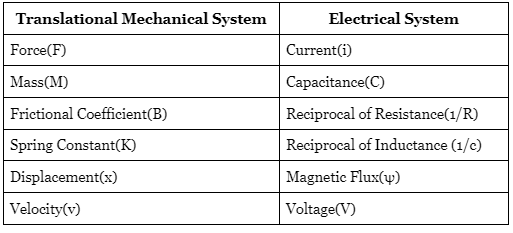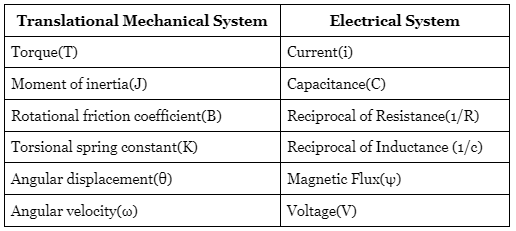Electrical Engineering (EE) Exam > Electrical Engineering (EE) Notes > Control Systems > Electrical Analogies of Mechanical Systems
Electrical Analogies of Mechanical Systems | Control Systems - Electrical Engineering (EE) PDF Download
Two systems are said to be analogous to each other if the following two conditions are satisfied.
- The two systems are physically different
- Differential equation modelling of these two systems are same
Electrical systems and mechanical systems are two physically different systems. There are two types of electrical analogies of translational mechanical systems. Those are force voltage analogy and force current analogy.
Force Voltage Analogy
- In force voltage analogy, the mathematical equations of translational mechanical system are compared with mesh equations of the electrical system.
- Consider the following translational mechanical system as shown in the following figure.

- The force balanced equation for this system is
F = Fm + Fb + Fk
- Consider the following electrical system as shown in the following figure. This circuit consists of a resistor, an inductor and a capacitor. All these electrical elements are connected in a series. The input voltage applied to this circuit is V volts and the current flowing through the circuit is i Amps.

- Mesh equation for this circuit is
 (Equation 2)
(Equation 2) - Substitute, i = dq/dt in Equation 2.

 (Equation 3)
(Equation 3) - By comparing Equation 1 and Equation 3, we will get the analogous quantities of the translational mechanical system and electrical system. The following table shows these analogous quantities.

- Similarly, there is torque voltage analogy for rotational mechanical systems. Let us now discuss about this analogy.
Torque Voltage Analogy
- In this analogy, the mathematical equations of rotational mechanical system are compared with mesh equations of the electrical system.
- Rotational mechanical system is shown in the following figure.

- The torque balanced equation is
T = Tj + Tb + Tk Equation 4
Equation 4 - By comparing Equation 4 and Equation 3, we will get the analogous quantities of rotational mechanical system and electrical system. The following table shows these analogous quantities.

Force Current Analogy
- In force current analogy, the mathematical equations of the translational mechanical system are compared with the nodal equations of the electrical system.
- Consider the following electrical system as shown in the following figure. This circuit consists of current source, resistor, inductor and capacitor. All these electrical elements are connected in parallel.

- The nodal equation is
 (Equation 5)
(Equation 5) - Substitute, V = dΨ/dt in Equation 5.

 (Equation 6)
(Equation 6) - By comparing Equation 1 and Equation 6, we will get the analogous quantities of the translational mechanical system and electrical system. The following table shows these analogous quantities.

- Similarly, there is a torque current analogy for rotational mechanical systems. Let us now discuss this analogy.
Torque Current Analogy
- In this analogy, the mathematical equations of the rotational mechanical system are compared with the nodal mesh equations of the electrical system.
- By comparing Equation 4 and Equation 6, we will get the analogous quantities of rotational mechanical system and electrical system. The following table shows these analogous quantities.

The document Electrical Analogies of Mechanical Systems | Control Systems - Electrical Engineering (EE) is a part of the Electrical Engineering (EE) Course Control Systems.
All you need of Electrical Engineering (EE) at this link: Electrical Engineering (EE)
|
53 videos|74 docs|40 tests
|
Related Searches

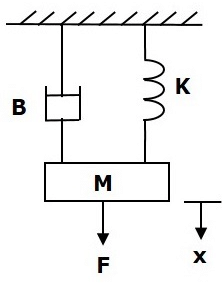

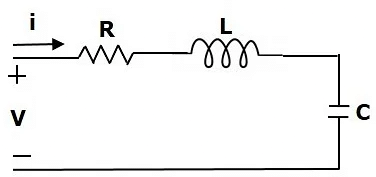
 (Equation 2)
(Equation 2)
 (Equation 3)
(Equation 3)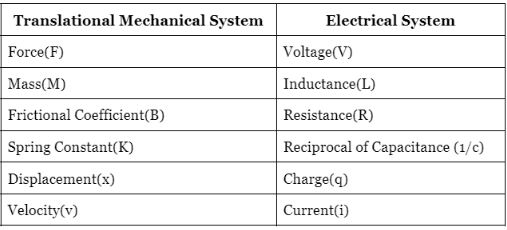
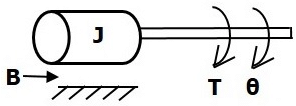
 Equation 4
Equation 4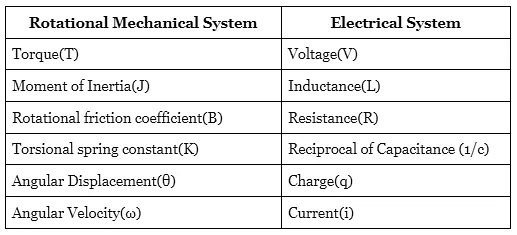
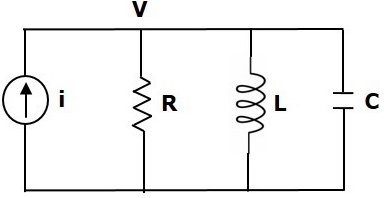
 (Equation 5)
(Equation 5)
 (Equation 6)
(Equation 6)